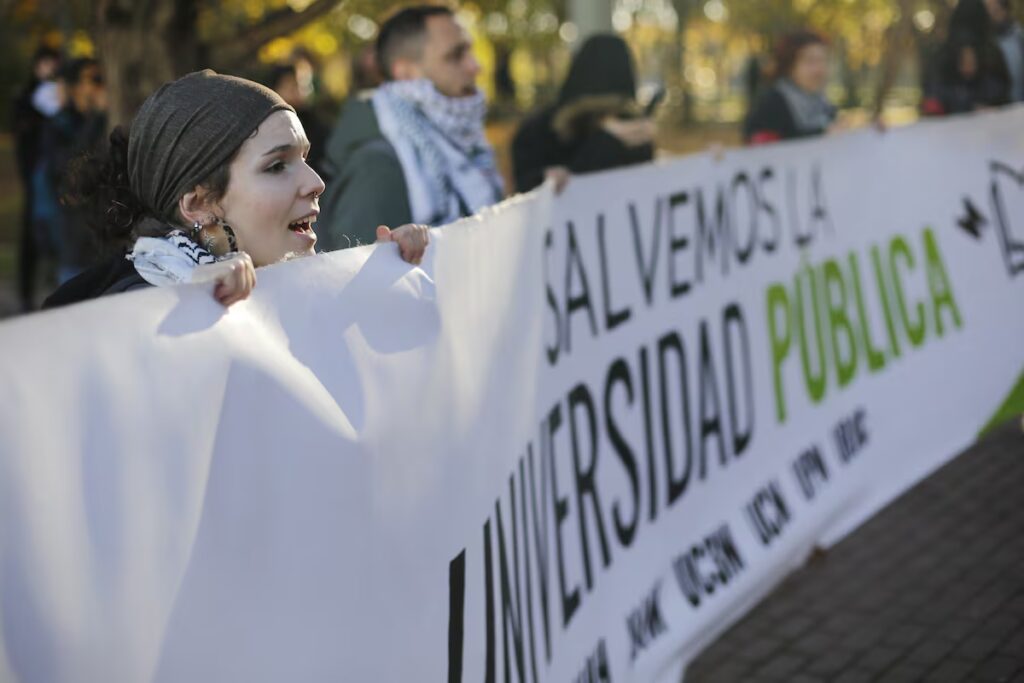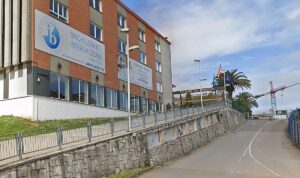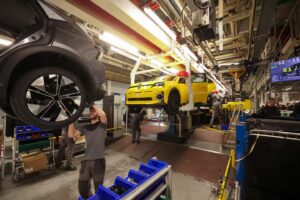
Fear of the future has left practically all the classrooms of the Complutense University deserted in the first of the two days of strike called this Wednesday and this Thursday in the public universities of Madrid to denounce their economic asphyxiation. They are almost back to the times of the pandemic. Not even the information pickets have a job. An apocalyptic scenario that is not repeated in the other centers, even if activity is nil in many faculties of the Autonomous University and very low in Rey Juan Carlos. The follow-up to the strike is much higher than the strike of April 25, which had no impact because it coincided with the electricity blackout. In the Rey Juan Carlos car park in Móstoles, 60% of the spaces are empty, which serves as a thermometer, and in the Autonomous Community there is no activity in several faculties.
The real protagonists of the day are the students. Student delegations from the six campuses unanimously supported the strike, and an academic strike was declared at UCM, the Autonomous University and Rey Juan Carlos. A figure included in the new university law (LOSU, 2023) which today prevents professors from carrying out exams and appeals and delays the submission of homework.
At nine in the morning the Somosaguas campus of the Complutense seemed like a desert. In addition to the picket made up of students and teachers, only one Economics student was waiting for the bus to go home. A foreign student who arrived from China today was the only one who didn’t know that a strike had been called. In the Psychology, Social Service and Economics buildings the only workers present were the cleaners.
“We will significantly strengthen the six-year investment (in the six public universities),” Isabel Díaz Ayuso, president of the Community of Madrid, declared last July. But since then Complutense has had to ask for a loan to pay its salaries, the regional government has recognized that Rey Juan Carlos is on a razor’s edge and the budget has increased by just 6.5%, which does not exclude the most affected campuses from the UCI. The six would need to receive an additional 310 million to return to the 2009 allocation, discounting 15 years of inflation.
The dean of the Faculty of Economics and Business, Álvaro Rivero, confirms that the monitoring was practically total. “There are no students and the teachers and staff supported the strike en masse,” he says. As he explains, “there are no longer functioning classes, neither in the pavilions nor in the classroom”. For Rivero, this level of participation reflects the strength of the demand: “It is an indicator of how important the cause is, the reasons exist and practically all the staff and all the students support them.”
Álvaro Briles, professor of the faculty and member of the CGT union, points out that the support was unprecedented for Económicas, a center that usually appears “more passive” in this type of protests. Remember that in previous strikes there was always some class going on. He attributes the success of the strike to the previous preparation work and campaigns carried out to raise awareness among both students and teachers.
Somosaguas is known for its spirit of protest – the dictator Francisco Franco isolated the most “problematic” faculties such as Political Science on the campuses – but the image of total emptiness is repeated in the Ciudad Universitaria. The physical sciences and history, for example, have no life. Not even in Medicine, which never stops. According to UCM for the Public, 2% of lessons were held in Pharmacy. Unlike the Polytechnic, where a picket attempted to enter several classes of the Faculty of Civil Engineering, where the impact of the strike, as always, is small.
At the Autonomous University of Madrid, far fewer students got off the train than on a normal Wednesday. Those who arrive know there is a strike, but some of their teachers have decided to hold lessons anyway. Some faculties, such as Humanities, are closed, others operate with minimal services such as Philosophy and Humanities. In Economics you see some study groups. The picket of almost 70 people, mostly students who organized themselves to demonstrate, goes around the buildings one by one with whistles and songs and distributes leaflets to students and workers.
Among them walks Jaume Novelle, 22 years old, who should attend the dissection lesson, but he and his classmates won’t go because they won’t have the roll call. He is in his second year of Medicine and is interested in dedicating himself to Emergencies. He volunteered in Samur. It says its faculty is “privileged within the Autonomous University” and yet classes were closed due to the collapsing ceilings. Novelle says plans have been made to protect students’ right to strike to move studies and handle placements at the hospital.
Cristina Cano says that since she joined the UAM Faculty of Economics as a librarian in 2019, “subscriptions to databases, very expensive resources that are used for research, have reduced.” The 47-year-old worker explains: “A lot of research is done here and it is used so that students and teachers can do their research and publish their projects.” According to him, the state of the library is “a reflection of what happens in every university”. Furthermore, Cano assures that his salary will be frozen and will only adapt “to what the national government has increased by decree”. Cano complains: “The lack of staff is very evident, no new positions are created and we have more and more tasks.”
Rey Juan Carlos is in a slightly better economic situation than Complutense – they didn’t have to ask for a loan – but they will end their accounts in the red for the second year. They will pay them with the rest they have left, but there is not enough for next year and the fear is starting to spread. There are no minimum services at that university, which is why the Móstoles library is closed this morning because no workers came. According to CGT data, four of the 22 classrooms in the Fuenlabrada hall are occupied by around 70 students.
“The monitoring is massive, but not total because there are teachers who do not share this strike. There is a bit of practice and lessons and this causes a certain movement of the students. There was also a visit to an institute”, says Rubén Torices, professor of Ecology at the URJC and member of the information picket.





